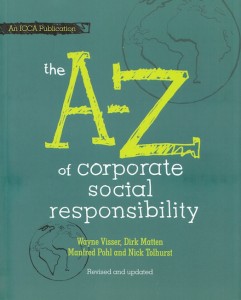Myths About CSR in Developing Countries
Blog by Wayne Visser
Part 10 of 13 in the Age of Responsibility Blog Series for CSRwire.
Are conceptions and models of CSR developed in the West appropriate for developing countries? I first tackled this question by setting out what I believe to be 7 popular myths about CSR in developing countries. Most of these myths exist as a result of the feeding frenzy that inevitably occurs every time the media has hunted down and sunk its teeth into one or other juicy story of corporate exploitation. The myths are also sustained, however, by whole legions of largely well-intentioned people who have vested interests in promoting their particular brand of the truth about CSR.
- Economic growth is not compatible with CSR
- Multinationals are the biggest CSR sinners
- Multinationals are the biggest CSR saviours
- Developing countries are anti-multinational
- Developed countries lead on CSR
- Codes can ensure CSR in developing countries
- CSR is the same the world over
Let’s look at these myths each briefly in turn.
Myth 1 – Economic growth is not compatible with CSR.
What the Index for Sustainable Economic Welfare and Genuine Progress Index show is that GDP growth and quality of life move in parallel until social and environmental costs begin to outweigh economic benefits. According to this ‘threshold hypothesis’ (coined by Chilean barefoot economist, Manfred Max-Neef), most developing countries have yet to reach this divergence threshold. For them, economic growth and the expansion of business activities is still one of the most effective ways to achieve improved social development, while environmental impacts are increasingly being tackled through leapfrog clean technologies.
Myth 2 – Multinationals are the biggest CSR sinners.
On the ground in most countries, multinationals are generally powerful forces for good, through their investment in local economies, creation of jobs, upgrading of infrastructure, provision of basic services and involvement in community development and environmental conservation. There are always exceptions, of course, and these should be named and shamed. But they shouldn’t overshadow the overall positive role of big companies in developing countries. The cumulative social and environmental impacts of smaller companies, which operate below the radar of the media and out of reach of the arm of the law, are typically far larger than that of the high profile multinationals.
Myth 3 – Multinationals are the biggest CSR saviours.
Not only do large companies have limited influence over government policy, but most multinationals, despite large capital investments, provide only a minuscule proportion of the total employment in developing countries. The real potential saviours are small, medium and micro enterprises (SMMEs), including social enterprises, which are labour intensive and better placed to effect local economic development. If the social and environmental impacts of these SMMEs can be improved, the knock on benefits will be proportionally much greater than anything that multinationals could achieve on their own. This is why the work CSR for SMEs by Anuhuac University in Mexico and Forum Empresa in Latin America is so encouraging and important …
Continue reading
[button size=”small” color=”blue” style=”download” new_window=”false” link=”http://www.waynevisser.com/wp-content/uploads/2012/06/blog_myths_developing_wvisser.pdf”]Pdf[/button] Myths About CSR in Developing Countries (blog)
Related websites
[button size=”small” color=”blue” style=”tick” new_window=”false” link=”http://www.csrinternational.org”]Link[/button] CSR International (website)
[button size=”small” color=”blue” style=”tick” new_window=”false” link=”http://www.waynevisser.com/books/the-age-of-responsibility”]Link[/button] The Age of Responsibility (book)
Cite this blog
Visser, W. (2011) Myths About CSR in Developing Countries, Wayne Visser Blog Briefing, 8 December 2011.








